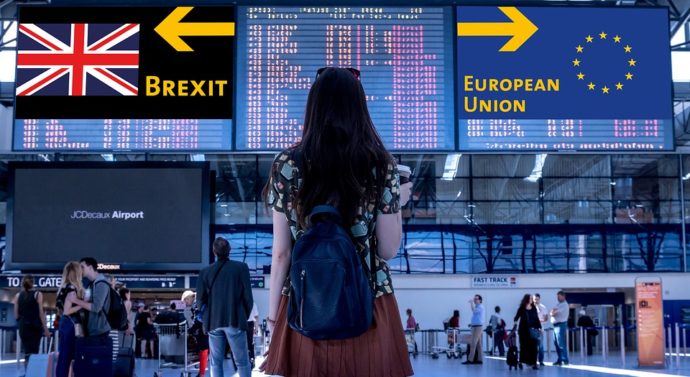
Brexit: Is the UK finally pulling the plug on the EU?
News September 6, 2019, Comments Off 56Three years ago, on June 23, 2016, the United Kingdom’s Prime Minister, Theresa May, called for a vote. Her party wanted to know the people’s opinion on an issue we all affectionally call “Brexit”. It passed, just barely, and the date for Brexit was set to March 29, 2019. For two years, May argued and negotiated with the Eurpoean Union (EU). Three times she presented Parliament with a Brexit deal and three times it was rejected. March came and went but without a deal, Brexit did not happen. In May 2019, May resigned from her position as Prime Minister and as conservative party head, and a man by the name of Boris Johnson took over the United Kingdom’s government.
Three years from the Brexit referendum and Johnson has set a new date for Brexit: Oct. 31, 2019, just two months away. At this time, there is still no deal between the UK and EU, Parliament is suspended and Johnson has sworn to carry out a Brexit with or without a deal.

Photo via pixabay.com
Brexit Basics
At its core, Brexit is simply the United Kingdom’s attempt to leave the European Union for good. The EU was established after World War II in order to stop France and Germany from fighting once again. It was planned to be nothing more than a financial neutrality, but as more countries joined, it grew into a political powerhouse. The EU allows its 28 European countries to freely trade between each other without import or export taxes, does not require passport checks or border control stops between countries, and establishes a uniform currency throughout Europe.
The United Kingdom and Denmark are the only countries part of the EU that still maintain their own currencies. The UK is kind of like a smaller, island version of the EU. It is made up four independent kingdoms – England, Scotland, Wales and Northern Ireland. There are two halves of Ireland, Northern Ireland, part of the UK, and the Republic of Ireland, an independent nation and member of the EU. This distinction is incredibly important as it is one of the biggest blockades in the Brexit deal.
The Ireland Issue
Back in the 1970’s, a terrorist organization in the Republic of Ireland decided to go to war with Britain for control over Northern Ireland. It was a long, bloody conflict that didn’t end until 1998 and the loss of many innocent lives. The treatise that finally settled the matter was called the Good Friday Agreement. Drury University political science professor, Dr. Elizabeth Paddock explained, “The Good Friday Agreement plus the European Union allowed Northern Ireland and the Republic of Ireland to trade without any barriers, without a formal wall… since 1998, they have had an open border.”
Many citizens are concerned that a Brexit deal threatens this border and the peace. Part of the orginal deal contained a measure to maintain the current state of affairs called a backstop. This backstop means that everything in Ireland will stay exactly how it is right now – no border wall, no stops. Parliament is strongly divided on this issue. Some want the backstop to stay because they are concerned that without it, the fighting ensue once again. Some want it gone because they see a backstop as continued subjugation to the EU. Others are starting to regret the idea of Brexit altogether.
“No-Deal” Brexit
Prime Minster Boris Johnson, on the other hand, is barreling towards Brexit at breakneck speed. He had declared that the UK will leave with or without a deal. Many see a “no-deal” Brexit as the worst possible outcome. The original terms that May worked out with the EU were not the best – they did include an exit fee for the UK that was estimated to be around £39 billion (47 billion in U.S. dollars) but it is better than what will happen without.

Photo via pixabay.com
Or at least that is what the world is waiting to find out. No one actually knows what will happen to the UK after Brexit. This is completely uncharted territory as no one has ever left the EU before. There is a clause in the contract that brings a country into the EU that allows them to leave known as Article 50, but it’s never been triggered before.
Dr. Jeffery VanDenBurg of Drury’s political science department said, “[Article 50] basically sets timetables and the basic principle underneath it is that all the parties have to agree.” However, that timetable only allows for two years of decision making and the United Kingdom’s time is up.
There are a few things we know for certain will happen. For a while the value of the pound will continue to fall and the citizens of the UK will have a harder time traveling between the EU and home. According to the BBC “This could lead to delays at ports, such as Dover. Some fear that this could lead to traffic bottlenecks, disrupting supply routes and damaging the economy.”
Others have theorized about more drastic, long term consequences for Brexit. Many suspect that Scotland will finally make good on their threat to leave the UK altogether and, depending on how the Irish backstop plays out, may mean a reunification of Ireland and a departure from the UK. For now, the world will just have to wait and see what the fate of the United Kingdom will be.
Written by Afton Jagels.